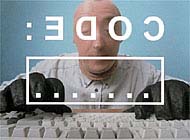
World Economic Forum tries to get to bottom of hacking embarrassment

The World Economic Forum (WEF) says it has launched an internal investigation to find out how hackers accessed sensitive information about some of the world's richest and most powerful people stored on one of its computer systems.
“It goes without saying that we’ve launched a serious investigation to determine how this took place,” WEF spokesman Charles McLean told swissinfo. “We take this incident very seriously.”
“We consider this regrettable and we’re doing everything we can to protect the privacy of our members and our participants,” he said.
He said that the US State Department and Pentagon had also been the victim of hackers, so it was “not unthinkable that there would be a security breach at the World Economic Forum”.
Among the personalities whose details were accessed were the South African president, Thabo Mbeki, the Palestinian leader, Yasser Arafat, the Microsoft chief, Bill Gates and a number of other political and business leaders.
Organisers said that, contrary to media reports, sensitive information about the former US president Bill Clinton, had not been compromised.
The secret data, which had been copied to a CD-Rom, was anonymously leaked to the Swiss weekly newspaper, the “SonntagsZeitung”.
The WEF says it is treating the affair as a criminal act, but McLean refused to be drawn on whether anti-globalisation activists were to blame: “It could have been teenagers with too much time on their hands, for all we know. It would be irresponsible on our part to even speculate,” he said.
“We don’t regard this as a prank or a political statement, we regard it as a crime. Raiding someone’s database is illegal in Switzerland,” McLean said.
He said it appeared that the hackers managed to penetrate a “remnant database” used to accumulate information on participants at regional WEF meetings held during 2000. Neither the WEF’s main computer system in Geneva, nor the one used for Davos 2001, were apparently targeted.
The data was mainly the kind of information which is readily available in the participants booklets handed out at such meetings. However, the credit card details of around 1,400 participants was also taken.
McLean said the people affected had been alerted and a hotline set up, but said it was still too early to say what their reaction had been.
The theft of their confidential details adds to the pressure on the Forum, which attracted vociferous criticism over the unprecedented security operation deployed in Davos last month.
Non-governmental organisations attending the meeting accused the Swiss authorities of stifling peaceful protest through heavy-handed policing and the organisers of paying only lip service to a genuinely inclusive debate on globalisation.
“The security is necessary because of threats made to the World Economic Forum by various groups. That security is there to protect the people taking part in the meeting. It’s something over which we have very little control,” McLean told swissinfo.
The sight of huge numbers of armed police patrolling this small alpine town prompted many to suggest that the WEF had outgrown Davos, and wonder if it might decide to move elsewhere.
“I think Davos remains a great home for the forum,” McLean said, adding that in terms of participants, the forum was the same size as it had been for a number of years.
“It’s not a question of outgrowing Davos, it’s a simply a question of applying adequate security to make sure a meeting like ours can go ahead in the future.”
Whether the Swiss government is happy to continue providing such security is open to question. But what is clear is that, as long as the forum is perceived as being a vehicle for the corporate world, it will be targeted by those opposed to globalisation.
by Roy Probert

In compliance with the JTI standards
More: SWI swissinfo.ch certified by the Journalism Trust Initiative






























You can find an overview of ongoing debates with our journalists here . Please join us!
If you want to start a conversation about a topic raised in this article or want to report factual errors, email us at english@swissinfo.ch.